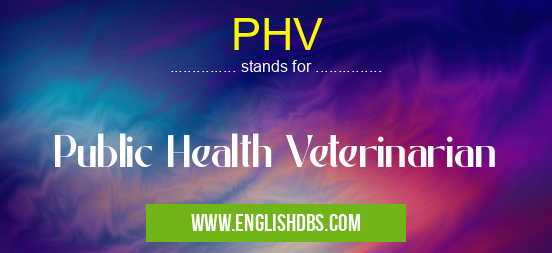What does PHV mean in HEALTHCARE
When searching for acronyms and abbreviations, it is important to understand what they mean. The acronym PHV stands for Public Health Veterinarian. This type of professional is someone who works with both veterinary and public health professionals to protect the well-being of humans and animals. They strive to understand how diseases spread between animals and humans, as well as ways to prevent these diseases from spreading further. By understanding the risks that exist, PHVs can provide support and guidance in understanding various issues related to health hazards and safety concerns for both humans and animals.

PHV meaning in Healthcare in Medical
PHV mostly used in an acronym Healthcare in Category Medical that means Public Health Veterinarian
Shorthand: PHV,
Full Form: Public Health Veterinarian
For more information of "Public Health Veterinarian", see the section below.
» Medical » Healthcare
Essential Questions and Answers on Public Health Veterinarian in "MEDICAL»HEALTHCARE"
What is a Public Health Veterinarian?
A Public Health Veterinarian (PHV) is a veterinarian dedicated to improving and protecting public health by studying, preventing, and controlling diseases and pests that may be spread between animals, humans, and the environment. PHVs typically work in government agencies or research institutions monitoring the health of animals and people. They are also involved in developing public health policies to prevent the spread of zoonotic diseases between humans and animals. They analyze epidemiological data, design surveillance systems for animal-related diseases, conduct laboratory research, educate the public about animal disease prevention, and much more!
What kind of degree do I need to become a PHV?
In order to become a Public Health Veterinarian (PHV), one must complete an accredited Doctor of Veterinary Medicine (DVM) program followed by postgraduate training in veterinary public health. Additionally, many organizations require PHVs to hold board certification through specialty boards such as the American College of Veterinary Preventive Medicine or European College of Veterinary Public Health. To stay informed regarding the latest developments in veterinary public health, PHVs often attend conferences or participate in webinars throughout their careers.
How can working as a PHV improve human and animal health?
Working as a Public Health Veterinarian (PHV) provides an opportunity to make advancements in human and animal health on both local and global levels. As they monitor animal diseases that could potentially infect humans, they are providing information essential for effective management strategies for the prevention of such diseases. In addition to this work at government agencies or research institutions, PHVs may also engage directly with communities through education programs about proper food safety practices or preventive measures like vaccinations. By promoting awareness about zoonotic diseases that can result from contact with certain animals or contact with undercooked food items, PHVs can reduce risks to both human and animal populations.
What type of career opportunities are available for PHVs?
Career opportunities for Public Health Veterinarians (PHVs) vary greatly depending on individual interests and education levels obtained. Some examples include working in local government positions at environmental protection agencies focused on issues related to wildlife management; positions within research laboratories researching zoonotic diseases; development roles designing new methods for control of infectious agents; clinical practice focused on companion animals using principles of population medicine/public health; educating medical students & veterinary students about One Medicine principles; consultant roles advising organizations on disease prevention strategies; teaching roles at universities focusing on veterinary public health topics; positions leading nonprofits advocating animal welfare initiatives; etcetera!
How does knowledge from other fields contribute to being a successful PHV?
To be successful as a Public Health Veterinarian (PHV), it’s important to draw knowledge from other fields such as epidemiology, environmental sciences and toxicology. By understanding how certain factors outside of just medical ones can contribute to transmission or outbreaks of certain illnesses—including climate change implications—it’s possible to create wider-reaching solutions than one might think by viewing things from only one perspective or field alone. Additionally having strong communication skills is important because presenting complex concepts clearly can help increase understanding among those making decisions around policy implementation.
What challenges do PHVs face?
One challenge faced by Public Health Veterinarians (PHVs) is staying aware of all developments happening within their field due its interdisciplinary nature. Interpretation of data requires expertise beyond just medicine so it’s important for these professionals to have knowledge not only around species biology but also around relevant topics such as economic conditions influencing people’s healthcare habits etcetera which may be outside their own area of expertise but which is nonetheless pertinent information when attempting to come up with appropriate preventative efforts.
What types of tools do PHVs use?
The tools used by Public Health Veterinarians (PHVs) largely depend on the particular scope within which they are working however some examples include epidemiological studies; GIS mapping software capabilities coupled with geographic locations where outbreaks occur; molecular diagnostics capabilities allowing identification/distinction between different strains/species/microbes circulating within populations etcetera.
What advantages does someone gain from being a PHV versus any other veterinarian occupation?
The primary advantage gained from working as a Public Health Veterinarian (PHV) versus any other veterinarian occupation lies in its focus on population-level considerations rather than solely individual cases/animals making any changes put into effect potentially more far reaching thereby impacting many lives even if indirectly rather than just few.
Final Words:
Public Health Veterinarians are an essential part of protecting both human and animal populations from potentially deadly diseases or other harmful effects caused by mistreatment or negligence towards either species. By combining scientific knowledge with practical experience in both veterinary medicine and public health disciplines, these individuals are uniquely qualified for developing methods that reduce risks associated with zoonotic disease transmission or mishandling food products derived from animals sources. With PHVs playing an increasingly significant role in our society today, it is crucial that their expertise be both acknowledged and respected by all who make use of it.
PHV also stands for: |
|
| All stands for PHV |
